The Best Ecommerce Solution For Small Businesses
I am an affiliate with links to an online retailer in this blog post. When you read what I have written about a particular product and click on that link and buy something from the retailer, I can earn a commission. Please note that I only recommend products that I truly believe in and use in my business. Please read my full disclaimer here
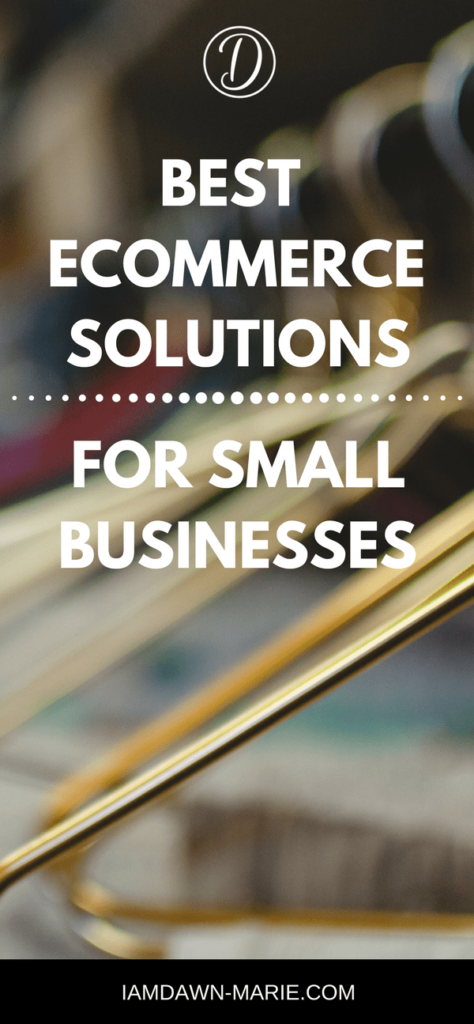 As you may know there are many eCommerce platforms in the online space that help creative entrepreneurs build their stores on the internet.
As you may know there are many eCommerce platforms in the online space that help creative entrepreneurs build their stores on the internet.
According to Datanyze there are approximately 404 eCommerce platforms that have a market share on the internet.
Whether you want a small store with simple design features or a large scale store with higher volume traffic, the type of eCommerce platform you choose is important to ensure that your customers get the best customer experience and you as the owner get good merchant value.
Having started my own eCommerce store last year and testing a number of different platforms before finally settling down to one, I wanted to speak about my experience and why I chose Shopify as the best eCommerce platform for any start up business.
The purpose of this guide is to help other eCommerce entrepreneurs with their buying decisions and give them a few things to think about when choosing an eCommerce platform to grow their business.
In this post I will be reviewing Shopify and will share with you the features of this platform that helped me make the decision to switch from my old eCommerce store builder, Woocommerce.
You may be in between platforms or looking to create your own online store. If you thought about using Shopify then hopefully this post will help you make your decision with certainty.
Here is what you will learn:
- 5 important requirements to consider before you decide on an eCommerce platform
- How Shopify has taken over the eCommerce market
- The 8 pros of Shopify
- The major cons of Shopify that can change your mind
- Why you should use Shopify to build your eCommerce store
5 Important Requirements To Consider Before You Decide On An Ecommerce Platform
Before you start any business it is imperative that you do your research to find out key components that will help you either thrive or dive.
The same is with an eCommerce platform. Choosing one is not as simple as deciding between Hotmail or Google. There are many platforms in the market to choose from. Those include Shopify, 3dcart, Bigcommerce, Woocommerce and others.
Here are five of the most important requirements to consider before ultimately deciding on an eCommerce platform.
1. Mobile Responsiveness
According to Invesp, over two billion mobile phone users will make some form of mobile commerce transaction.
This is a clear indication that more and more people are shopping online so there is no doubt about the importance of a mobile responsive store.
Therefore when choosing any platform your first thoughts should be whether it offers mobile responsive designs.
Many platforms already understand this trend so the options available for mobile responsiveness is very large.
2. Security
The importance of security is huge among online shoppers. It certainly should be for you as well as the trust and integrity of your store is dependent on whether you can provide a safe shopping environment for your customers.
Therefore do not rely on a few security badges to prove that your store fits the bill. Make sure that the eCommerce platform you are using provides an SSL certificate (Secure Sockets Layer). Most platforms include this certificate in their price plans where others you have to purchase your own certificates from your webhost.
3. Fast Website
The page load speed of an internet store can affect conversion rates. With many people expecting quicker processing, how fast your website loads is crucial to the number of visitors that bounce and those that stay.
Therefore factor this element in when considering an eCommerce platform. Remember that your store will have tons of high resolution images. Make sure that your eCommerce provider has the capacity to store the pixels of these images whilst preserving the ability to produce fast page speed.
4. SEO (Search Engine Optimisation)
When you are launching an eCommerce store sometimes ranking in the search engines is far from our minds when we are using advertising that does not involve SEO.
To solve this choose platforms that easily allow you to optimise your store for SEO.
For example you should be able to change the page’s meta descriptions with ease and implement SEO basics with minimal effort.
5. Payment Methods
This is an obvious feature of every eCommerce store but I’m going to take it one step further. It is so important that an eCommerce platform has a wide range of payment methods accessible to its users.
An eCommerce platform that caters to regional differences is ideal especially if your target audience does not live in a top tier country where payment methods like debit or credit cards is unconventional.
How Shopify Has Taken Over The Ecommerce Market
Shopify is a leading eCommerce platform that helps small and large businesses build optimised, user friendly eCommerce stores.
Shopify was built in 2006 by a group of five who wanted their own platform to sell snowboard equipment. They could have used different marketplaces to host their products but they found that the ability to build relationships with their customers and sell their own goods at the same time did not exist.
They soon realised that there were a number of small businesses who were in need of a hassle free tool and from this day Shopify was born.
There are over 500,000 active Shopify stores driving over $46 billion dollars in sales.
This only speaks volumes about the effectiveness of this platform for most of its users.
According to Google Trends, Shopify continues to grow in popularity as the favourite eCommerce platform, leading the way ahead of Woocommerce.
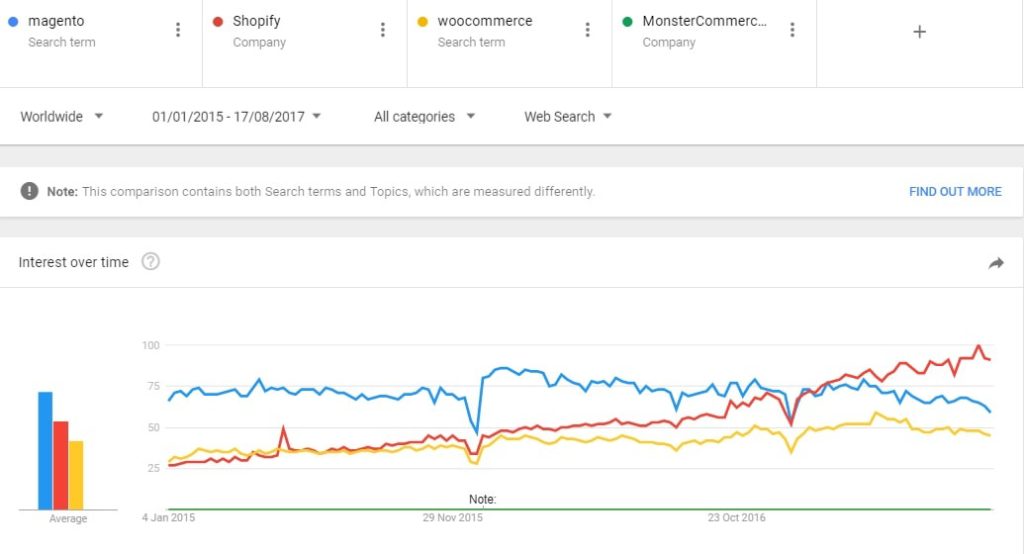
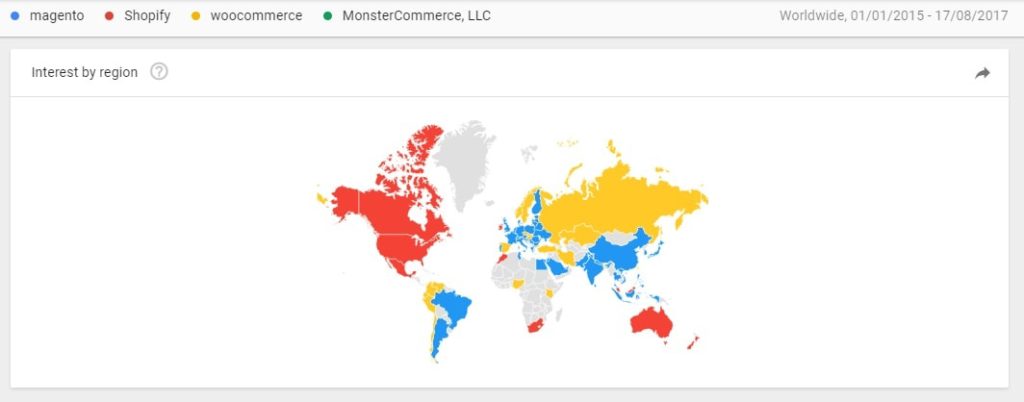
In the rest of these paragraphs I hope to show you how Shopify is qualified to be one of the best eCommerce store builders in the market.
It gives beginners and eCommerce experts the ability to start an eCommerce site with little effort and gives you everything you need to run a successful, profitable online store.
The 8 Pros Of Shopify
1. The Ease of Choosing a theme
The design of your website is ultimately important because it affects how likely a visitor is to leave your website once it lands on your page.
Most people make a decision to stay on your website depending on how easy it is to navigate the site. If the site looks cluttered or unusable then expert very low conversions.
Shopify helps you with your theme decision by providing ten free themes and paid themes from $140 from their Shopify Theme Store.
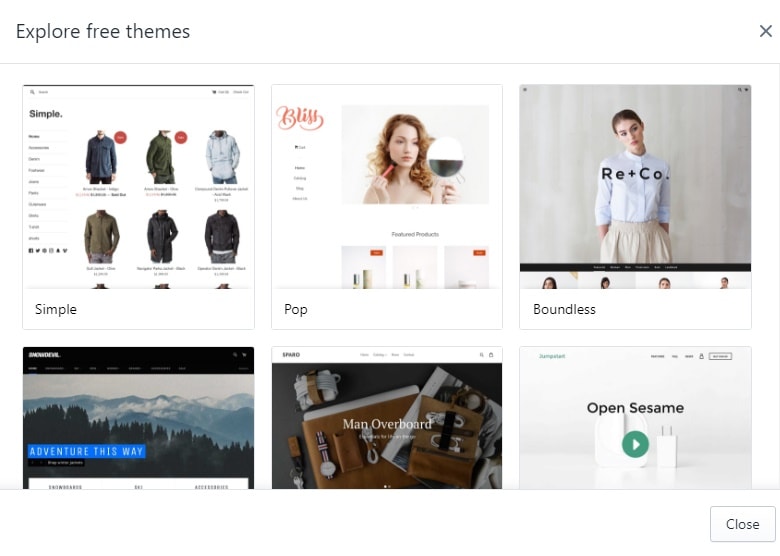
Their themes are absolutely professional that to any visitor it looks like a well put together store.
What I like about designing your store using Shopify themes is that it makes it easy to add content to your website using their customising editor.
Much like a drag and drop builder, Shopify uses sections so you can move around different sections based on how you would like it to appear in your store.
It’s also possible to redesign a theme if you would like a particular feature on your store but it is not provided by the theme.
As long as you know HTML and CSS code you can change the code to make more advanced customisations if you want to.
Also if you have a developer who can design a completely new theme for you, you can always upload this instead of choosing one of Shopify’s themes.

2. Integrating Apps
Shopify offers one of the biggest app selections across most eCommerce platforms, both free and paid.
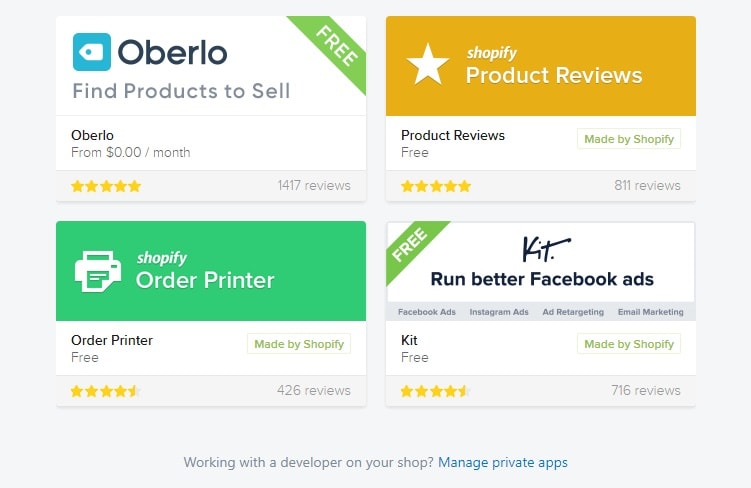
Apps help to improve the functionality of your store whilst adding some features that assist with store conversions.
The apps are quite simple to install. If you are familiar with WordPress plugins, the addition of Shopify apps can be done in just a couple clicks of a button.
Furthermore if you have created your own third party app which has not come from the Shopify App Store, you can easily add and manage this app from your dashboard.
If you are a developer and want to add your own app to the Shopify App store, then be prepared to go through Shopify’s requirements to have your app considered and then published on their platform. Don’t however be intimidated by their process. The review team is very friendly and helpful and will guide you to creating a successful app.
If however your app requires many revisions you will be given a second chance to get it right.
3. Ease Of Use
Even for the complete beginner, building an eCommerce store does not have to be hard. Shopify already said that their mission was to make commerce better for everyone.
I think they did a pretty good job of making that possible by providing simple features that anyone can navigate.
Even if you still want a show around there are many courses, free and paid, on the internet which show you how to get started with a Shopify store.
What I like about their new interface (Shopify actually did a complete makeover from their previous model to their newest version in June 2017) it takes the user from different steps in the stage of building your eCommerce store so there isn’t any overwhelm.
For example as you enter your main dashboard on the home screen you are given the options of adding a product, creating a custom domain, customising and editing your theme in a structured format.
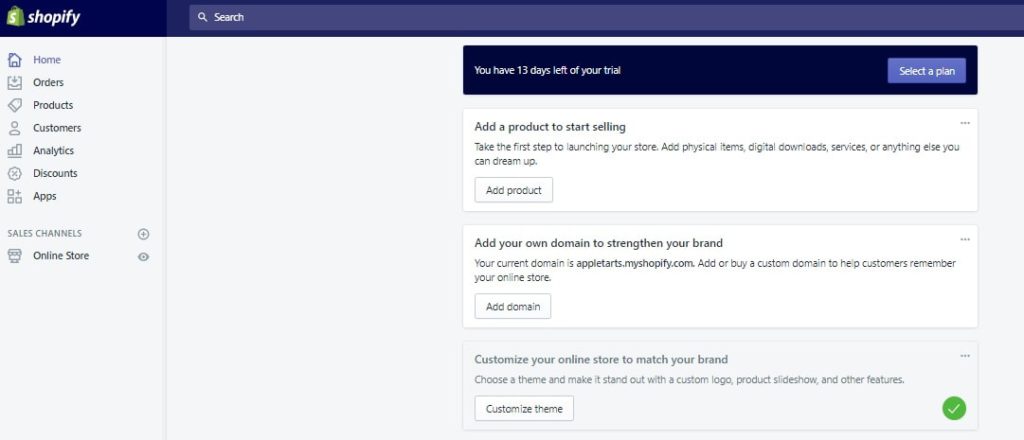
If you want to stick to these simple steps in a 1-2-3 fashion then you can. If you are more advanced the addition of apps will help you to expand your store.
It’s also worth pointing out that you can purchase a custom domain directly from Shopify for $14 per year. If you have your own third party domain that you purchased elsewhere then that too can be integrated onto the Shopify platform easily by following a few simple steps.
With the set up structure so easy to navigate I do not see how any beginner can get lost with Shopify. After all it is Shopify who are absolutely determined to be the number one eCommerce provider and they know that ease of use is of primary concern which is why they made it such a breeze to walk through.
4. Securing Your Shopify Store
Previously I spoke about the importance of security in your store. If there is any doubt as to whether your store is secure, customers will not make a purchase.
Also with Google’s recent focus on penalising websites that do not use SSL certificates, merchants are recognising how important security is for both the customer and the online web.
Thankfully Shopify is one step ahead by making sure that every store, regardless of their payment plan, has a free SSL certificate and that all connections are done over the recommended HTTPS rather than the HTTP.
![]()
Other security measures enabled by Shopify include two step authentication. This is a second layer of security which lets you unlock your Shopify account by using unique authentication codes provided by authentication software.
Shopify also has security badges which lets the customer know that they have entered a secure site. Shopify also complies with the highest standard of Payment Card Industry standards which is the standard required for information security.
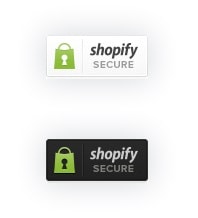
5. Shopify SEO
If you intend to use SEO to drive traffic to your eCommerce store then it is important that you can optimise your store for SEO easily so that buyers can find your site.
Shopify does a pretty good job by making sure it offers various elements to implement SEO.
Headings, image ALT tags, page title and meta descriptions can be easily inserted making it less difficult for your store to appear in the different search engines like Google, Yahoo or Bing.
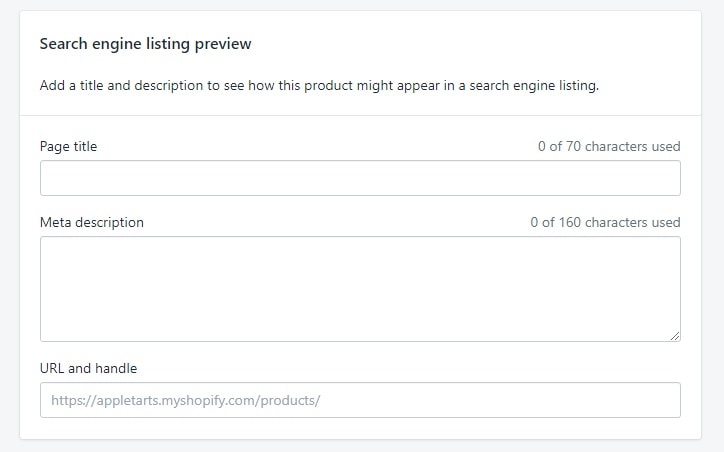
Some SEO is also taken care of automatically such as auto generated canonical tags which prevent duplicate content from appearing in search engines. Also your website’s sitemap.xml and robots.txt files are generated automatically including title tags which include your store’s name.
If you really want more guidance to perform well with SEO then thanks to SEO apps like the SEO Manager which you can find in the Shopify App store, you are able to enhance your site’s SEO.
These apps having trial periods but after this time there is a cost. Some start from $0 and go to $20 per moth.
6. Shopify Pricing
Shopify has 4 different price plans catering to everyone’s budget.
Shopify Lite which is $9 a month. With Shopify Lite you do not get a store framework. This plan is for anyone who wants to sell but do not want to maintain an online store. So you may want to sell in person, have a buy button on an existing website or use Facebook as a sales platform. This plan is ideal for you.
Shopify Basic is $29 per month and has everything you need to build an online store. So you can create, customise and manage an online store.
If you want help on your store you can hire two people who will have individual staff accounts. If you accept credit card payments via Shopify Payments, there are transaction fees of 2.9% + 0.30c that will apply. There is also an inbuilt blogging engine so if you like promoting products through blogging then this addition will come in handy.
Some of the other features of the basic plan include the ability to host unlimited products, discount codes, SSL certificate, 24/7 support. If you would like to view more about this plan then click here.
Shopify Plan is $79 per month and has everything you need to build an online store plus all the features of the basic plan. Credit card transaction fees however are 2.6% + 0.30c. You can hire up to five people to help you in your store having access to five individual staff accounts. In addition you can provide gift cards to your customers, run professional reports and automatically recover abandoned carts. If you would like to view more about this plan then click here.
Advanced Shopify is for those people who want to scale their business and have volume transactions. This is $299 per month. Your transaction fees are 2.4% + 0.30c. You get everything that the Shopify Plan has except you can now hire up to fifteen people, build advanced reporting and have third party calculated shipping rates show in your store if you are using carriers like UPS or Fedex for example. If you would like to view more about this plan then click here.
As a beginner you also have the opportunity to try out Shopify for a 14 day period. I am absolutely certain you will love the simplicity of this platform. Go right ahead and get started with your 14 day free trial here.
7. Shopify Support
All I can say is amazing!
Very helpful staff who from my experience will do their utmost to help you in anyway that they can.
One time I wanted an extra design on my store but did not know how to add the appropriate HTML code to the site.
I went to their support and BOOM! I got a free complimentary design for what I wanted and the outcome was excellent.
When I was having trouble with my Facebook share button on my store, Shopify stepped in and made certain that the matter was resolved with me the first time.
I did not feel rushed at all. I did not feel like I was a bother. The communication was smooth.
Shopify has 24/7 support regardless of your plan. Support can be given via chat, email or by telephone.
You can also get immediate communication with them when in need.
The one thing I do not like about other products is that when you are on a lower plan you get support within 24 hours. Not the same with Shopify. It does not matter which plan you are on, you are equal if you have purchased the lite plan to if you have purchased the Advanced Plan.
Aside from their support team they also have a library of information, video tutorials, webinars and community where you can figure things out on your own if you want to.

8. Shopify Payments
Taking payments from your customers is most important for every merchant. So far from what we have seen, Shopify integrates with most payment gateways from the major ones to international ones.
You can see a list of the current payment gateways by country here.
This gives the opportunity to people from all over the world to try Shopify as an eCommerce option.
It is highly recommended that before you start your store, that you study the payment gateways for your country to see whether it will work.
The Major Cons Of Shopify That Can Change Your Mind
From all the pros that I have listed on Shopify I do want to keep this review as genuine as possible and list some of the negative sides to Shopify that I did not like.
I mean Shopify isn’t all that and a bag of chips! 😜
These problems are those that I had experienced personally and felt it important to list it here so you can make an informed decision as to whether Shopify is for you or not.
There may be other negative sides listed on the world wide web, but I can only give my experience.
So here we go…
Shopify does not offer real time shipping unless you are on their Advanced Shopify Plan (Ummm. No thank you!) As a small business I needed automated shipping quotes but was not prepared to fork out $299/month.
I for the life of me could not understand why this was being tagged as a premium feature but hey I had to roll with the punches.
Also if you are using Shopify and living in the UK at the time I had to use Stripe as my payment gateway. This meant I was paying double transaction fees on Shopify and Stripe as at the time if you used a third party payment gateway you incurred Shopify transaction fees as well. So transaction fees for Shopify and transaction fees for Stripe. That meant a double whammy to my profits.
UPDATE: Shopify Payments is now available in the UK so transaction fees will not apply, only credit card fees. This now eliminates the need for a third party payment gateway so now you will only pay one set of fees.
Currently Shopify Payments are available only to stores in the US, Puerto Rico, Canada, UK, Ireland, Australia, New Zealand and Singapore.
As a side note be very careful when you are choosing your payment gateways. Make sure that you are aware what your outlay will be including your payment gateway transaction fees!
Wrapping Up
Shopify is no holy grail but it is a major contributor to the eCommerce marketplace having 11.14% marketshare.
Shopify is for any beginner if they know nothing about coding or website design. Even experts who want the ease and simplicity of running an online store can use Shopify.
From our experience, Shopify gets two thumbs up.
Give it a try. You might like it after you try their 14 day trial.
If you have tried Shopify already let me know in the comments what your thoughts are.
Cheers,



 Previous Post
Previous Post Next Post
Next Post




